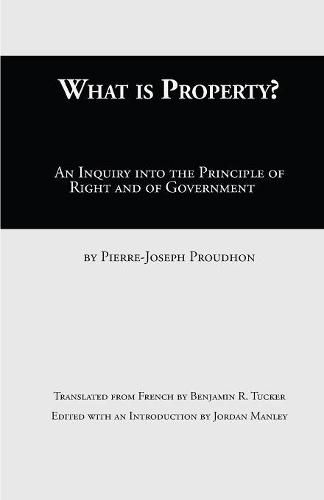Readings Newsletter
Become a Readings Member to make your shopping experience even easier.
Sign in or sign up for free!
You’re not far away from qualifying for FREE standard shipping within Australia
You’ve qualified for FREE standard shipping within Australia
The cart is loading…






When Pierre-Joseph Proudhon frst published What Is Property? in 1840, he was the frst self-proclaimed anarchist. This book was merely the beginning to his political ideals that led him to later become known as a leading social thinker during and after the French Revolution of 1848. In this book, Proudhon explores how proprietors of property rob the laborers of their wage. On a number of occasions, Proudhon’s passionate and controversial beliefs created problems for him with government authorities and other political thinkers alike. In one of his trials, Proudhon was declared innocent because the jury could not understand his arguments, and therefore could not condemn his statements.
On top of being a radical anarchist, Pierre-Joseph Proudhon was a French printer and philosopher, and his works influenced and contended with other pivotal schools of thought of the period. As a libertarian socialist, Proudhon found himself disagreeing with other political fgures at the time, like Karl Marx, on issues of property and freedom. As he traveled the countryside working various printer and editor positions, Proudhon witnessed and wrote about many of the socioeconomic injustices that oppressed the French working class. Proudhon’s writing had the most profound effect upon workers’ movements and the peasantry due to his humble roots.
$9.00 standard shipping within Australia
FREE standard shipping within Australia for orders over $100.00
Express & International shipping calculated at checkout
When Pierre-Joseph Proudhon frst published What Is Property? in 1840, he was the frst self-proclaimed anarchist. This book was merely the beginning to his political ideals that led him to later become known as a leading social thinker during and after the French Revolution of 1848. In this book, Proudhon explores how proprietors of property rob the laborers of their wage. On a number of occasions, Proudhon’s passionate and controversial beliefs created problems for him with government authorities and other political thinkers alike. In one of his trials, Proudhon was declared innocent because the jury could not understand his arguments, and therefore could not condemn his statements.
On top of being a radical anarchist, Pierre-Joseph Proudhon was a French printer and philosopher, and his works influenced and contended with other pivotal schools of thought of the period. As a libertarian socialist, Proudhon found himself disagreeing with other political fgures at the time, like Karl Marx, on issues of property and freedom. As he traveled the countryside working various printer and editor positions, Proudhon witnessed and wrote about many of the socioeconomic injustices that oppressed the French working class. Proudhon’s writing had the most profound effect upon workers’ movements and the peasantry due to his humble roots.